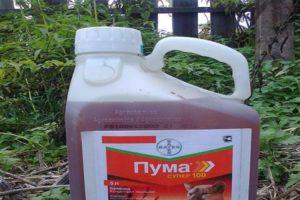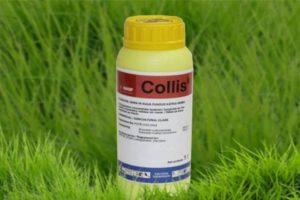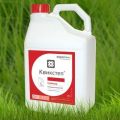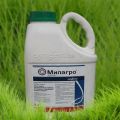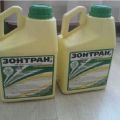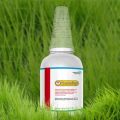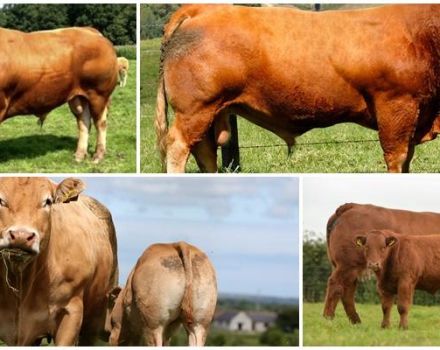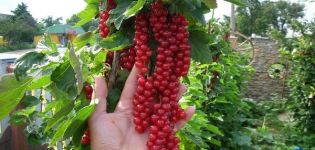Instructions for the use of the herbicide Corsair, consumption rates and analogues
Contact herbicides inhibit the aerial parts of weeds, so they are evenly sprayed with shoots and leaves. The substances of contact action include bentazone - the main active substance in the composition of the herbicide Corsair. The drug is used on crops of cereals, legumes, industrial, fodder crops to combat weed dicotyledonous annuals.
Content
- 1 Composition, release form and purpose of the herbicide Corsair
- 2 The mechanism of action of the agent
- 3 Impact speed
- 4 Protective period
- 5 Main advantages and disadvantages
- 6 Consumption rate of funds
- 7 Preparation of working solution and instructions for its use
- 8 Precautions
- 9 Phytotoxicity, crop tolerance
- 10 Possibility of emergence of resistance
- 11 Is it compatible with other products?
- 12 Storage conditions of the drug
- 13 Are there any analogues?
Composition, release form and purpose of the herbicide Corsair
Corsair is an effective contact type herbicide against dicotyledonous weeds. It is used in areas planted with cereals, legumes, forage, industrial crops, copes with weeds that are resistant to MCA and chemicals based on 2,4-dichlorophenoxyacetic acid.
The active substance is bentazone. The drug is available in the form of a concentrated, water-soluble liquid, poured into 10-liter canisters. The concentration of the solution is 480 g / l. The manufacturer is the Russian company "August".
The mechanism of action of the agent
Bentazone enters plant tissues through the surface of leaves and stems. Inhibits the reactions of photosynthesis in cells. As a result, the green mass dies off.
Impact speed
Noticeable signs of dying are noted after 3-4 days. The complete extinction of weeds on the site occurs in 10-12 days.
Protective period
The treated area remains clean until the second weed wave of the season.
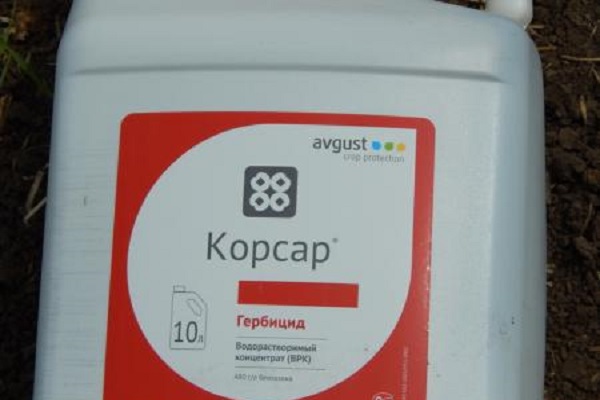
Main advantages and disadvantages
The herbicide Corsair is popular with farmers as it has the following benefits:
- does not have a toxic effect on cultivated plants, regardless of weather conditions;
- effective against almost all types of dicotyledonous weeds;
- does not imply strict terms of application;
- can be used on cereal crops with the inclusion of forage grasses;
- does not cause immunity in weed species.
Farmers do not note any particular drawbacks when using the herbicide Corsair.

Consumption rate of funds
The consumption rate is determined by which crop is being treated for weeds.
| Culture | Recommended consumption of funds, l / ha |
| Winter and spring cereals | 2-4 |
| Spring cereals with clover inclusion | 2-4 |
| Spring cereals with the inclusion of alfalfa | 2 |
| Rice | 2-4 |
| Legumes | 2-3 |
| Linen | 2-4 |
| Soy | 1-3 |
Rice plantation processing is carried out when the cereal produces 2 leaves, and weeds - 3-5. To prevent the herbicidal solution from being washed off the surface of the leaves, before the treatment, the water level in the flood field is lowered to 1-2 cm.
2 days after spraying, the field is filled with water again as standard.
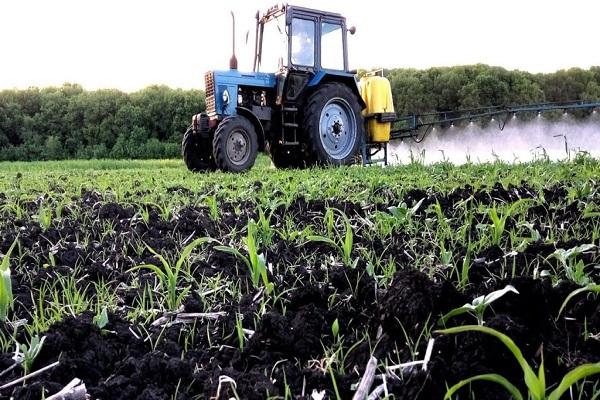
Preparation of working solution and instructions for its use
Herbicide treatment Corsair is carried out by spraying. The optimal time for work is the appearance of 3-5 true leaves in weeds. One-time treatment is permissible during the growing season. Consumption of working solution - 200-300 liters per hectare of sown area.
The working solution is made before work. Before opening the canister, the concentrate is thoroughly shaken in it. The tank of the spraying device is filled with water by a quarter, the required amount of concentrate is poured into it. The liquid is well mixed. During stirring, add water until the volume is filled.
Prepare the working solution on a protected site. After filling the tank, the site is cleaned.

The treatment is carried out at an air temperature of 10-25 ° C and a wind speed of no more than 5 m / s. In cool and windy weather, the herbicide is less effective. Peas and some other cultivated species are more susceptible to the effects of the drug, therefore, spraying is carried out on a cloudy day at an air temperature of up to 20 ° C. You cannot use the Corsair if there is a high probability of frost at night.
Precautions
The herbicide Corsair belongs to chemicals of the 3rd hazard class for humans, that is, it is a moderately toxic substance. Therefore, it is impossible to start cultivating the cultivated area without using standard eye protection, respiratory system, and skin.
First aid to a person injured by a chemical:
- the substance has got on the skin - wipe it off with a piece of cloth or cotton swab, wash the body area with soapy water;
- in the eyes - spread the eyelids with your fingers and gently rinse the eyeballs with plenty of water;
- the herbicide is accidentally swallowed - rinse the mouth with water, provoke vomiting, then immediately take activated charcoal (1 g of the drug per 1 kg of the victim's weight), drink plenty of water.
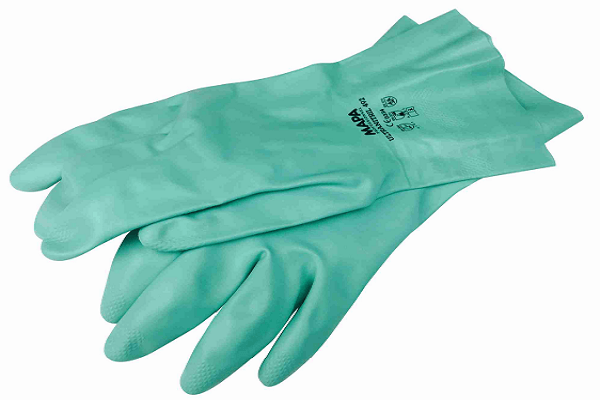
After the first aid measures, even if the state of health is normal, you should visit a medical specialist.
For fish, the 4th hazard class is a low-hazard substance. Therefore, the herbicide can be used to treat crops in the sanitary zone of reservoirs belonging to a fish farm.
Phytotoxicity, crop tolerance
If you follow the instructions and rules for use, then phytotoxicity is excluded.
It is not necessary to process cultures that are oppressed due to pathologies, unfavorable weather conditions and other negative factors.
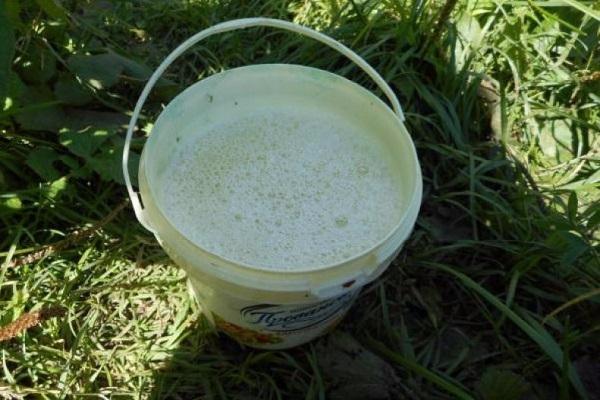
Possibility of emergence of resistance
The emergence of resistance to the herbicide in weeds is excluded.
Is it compatible with other products?
Corsair can be combined in a tank with chemicals with a neutral or alkaline composition. Mixing with acidic preparations is inadmissible.
Storage conditions of the drug
The herbicide Corsair is stored in the canister in which it was purchased. For storage, a separate place is chosen where the chemical will be harmless to nature objects. The herbicide does not deteriorate at temperatures from -5 to +40 ° C. Shelf life is 3 years if the canister is not depressurized.
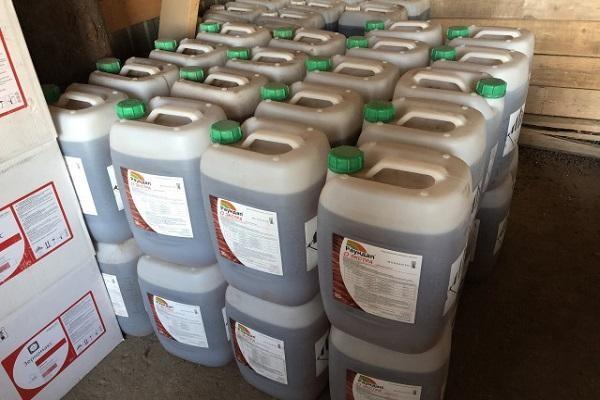
Are there any analogues?
The drug Corsar has analogues - contact herbicides based on bentazone:
- Buffalo;
- Bentogram;
- Bentasil;
- Granbaz;
- Basagran;
- Bentus.
All of these drugs are effective against dicotyledonous weeds. They are well tolerated by cultivated plants, characterized by a wide spectrum of action, and are used on crops of cereals, legumes, and fodder plants.
